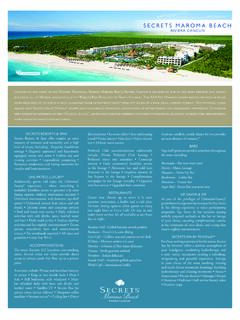Transcription of (c) leah4sci.com 2013
1 CONTENTS 1. (c) 2013. CONTENTS 2. 10 secrets to A'cing Organic Chemistry By Leah Fisch (c) 2013. CONTENTS 3. Legal Disclaimer/Copyright The information contained in 10 secrets to Acing' Organic Chemistry is meant to serve as a comprehensive collection of time-tested and proven strategies that the author of this eBook has used to substantially increase students' success in organic chemistry. The strategies and tips herein are only recommendations by the author, and reading this eBook does not guarantee that one's results will exactly mirror her own results. The author of 10 secrets to Acing' Organic Chemistry has made all reasonable efforts to provide current and accurate information for the readers of this eBook.
2 The author will not be held liable for any unintentional errors or omissions that may be found. The material in 10 secrets to Acing' Organic Chemistry may include reference to information, products, or services by third parties. The publication of such Third Party Materials does not constitute the authors' guarantee of any information, instruction, opinion, products or services contained within the Third Party Material. Use of recommended Third Party Material does not guarantee that your results will mirror the author's. Publication of such Third Party Material is simply a recommendation and expression of the authors' own opinion of that material.
3 As such, the author of this guide does not assume responsibility or liability for any Third Party material or opinions. 10 secrets to Acing' Organic Chemistry is protected under the US. Copyright Act of 1976 and all other applicable international, federal, state and local laws, and all rights are reserved. No part of this publication shall be reproduced, transmitted or resold in whole, or in part in any form, without the prior written consent of the author. (c) 2013. CONTENTS 4. CONTENTS. 05 Introduction: Why I Am Writing this e-Book 06 Secret # 1 Read Before Class 08 Secret # 2 Take Notes 09 Secret # 3 Read the Textbook Again After Class 10 Secret # 4 Practice, Practice, Practice!
4 12 Secret # 5 Beyond the Textbook: Supplemental Materials 14 Secret # 6 Understand, Don't Memorize 15 Secret # 7 Study Groups 17 Secret # 8 Peer Tutoring 17 Secret # 9 Office Hours 18 Secret # 10 Private Tutoring 20 Appreciation 21 About the Author (c) 2013. CONTENTS 5. INTRODUCTION. Why I Am Writing This e-Book Organic chemistry is considered to be one of the most difficult science courses in college. However, it is a requirement if you are pursuing a career in medicine, dentistry, pharmacology, veterinary medicine or anything else science related. Although the material is not inherently impossible to understand, students often find it impossible because they simply don't know how to approach this class.
5 If you don't know how to properly approach a course with difficult material, you will fall behind quickly. Instead of enjoying this challenging course, you'll find yourself struggling to stay awake and to stay with it. I found organic chemistry to be difficult at first but once I figured out the best way to approach the material and how to study, I realized that this class was not only doable, but actually fun! Organic chemistry is not like the other science classes in which you simply learn the formulas, memorize them and plug them in. In organic chemistry there are puzzles and reactions and sequences that while difficult at first, if you can understand and answer the questions and follow a challenging sequence, it's actually an exciting and satisfying feeling!
6 My goal with this e-book is to help you reach that understanding and experience that satisfying feeling. I want to give you the ability not only to survive your organic chemistry course but to enjoy it! If I succeed, you will no longer view orgo as a tedious course that you are forced to take and suffer through. Instead, you will get pleasure from it and possibly take your organic chemistry mastery with you to your graduate level studies. Perhaps, like me, you too will find organic chemistry to be one of the most exciting classes in your college career. If you follow the secrets in this e-book you can learn how to master organic chemistry, or at the very least survive it.
7 And the bonus plan is that you can apply the study tips and tricks in other courses for the rest of your college career and into your graduate studies! (c) 2013. CONTENTS 6. SECRET # 1. Read Before Class The mind works in mysterious ways. When you learn something for the first time, you usually pay attention, absorb some of it and probably think, Oh, that's interesting. But you're likely to forget it. The more you hear about a particular topic, the more information you absorb and consequently, the more you are likely to remember about that topic. When it comes to difficult material, the process is no different.
8 My first tip is to read the textbook before each class. Get a syllabus before the first class if possible or just try to find out what the professor will be covering in the first class and read those chapters. Before each class read the handouts or chapters in the book that the professor will be covering. Without this basic preparation, even if you sit in the front of your organic chemistry lecture and pay close attention to what the professor is saying, you will likely get lost very quickly. Even if you manage to follow the particulars provided in a lecture, your mind will be so busy trying to process that information that you won't actually learn and understand the deeper meaning.
9 If you read the material before class, whether you understand it or not, at least you will be somewhat familiar with it, and believe me, that will help. Don't get too frustrated if you don't understand it all. It will make sense later. When reading the chapter for the first time, you are simply exposing yourself to the basic concept. You will grasp some ideas and question others. At least you will have a foundation to build on. When you get to class and hear your professor lecture on the material, you'll find that you do recognize some of the information. Therefore your mind will not be so busy trying to process the information and you can actually learn and understand it.
10 (c) 2013. CONTENTS 7. In this way, you can focus on the more difficult concepts being addressed and the important questions being asked and answered. Some of the questions may be the same ones you had in mind so you will recognize them and therefore pay attention to those explanations. This will ensure that you get a much better learning experience out of every lecture. Best of all, if you understand what is being said, you will be able to ask better questions, which will in turn improve the quality of the information that you get out of the lecture. (c) 2013. CONTENTS 8.









